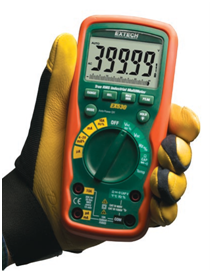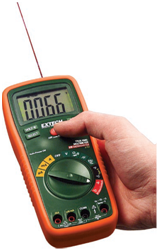The Basics on Digital MultiMeters
What is a Digital MultiMeter?
 A Digital MultiMeter, or DMM, is an electrical test device that can measure more than one electrical signal type. Test leads are used to connect to the device or circuit under test. The meter accepts the signal and displays the reading in the appropriate range and unit of measure.
A Digital MultiMeter, or DMM, is an electrical test device that can measure more than one electrical signal type. Test leads are used to connect to the device or circuit under test. The meter accepts the signal and displays the reading in the appropriate range and unit of measure.
What is the significance of True RMS in a DMM?
A True RMS MultiMeter more accurately measures AC (alternating current) signals. When measuring distorted or non-periodic AC waveforms, True RMS meters are essential. Standard meters, without True RMS, average the AC measurements and therefore are not as accurate for AC.
Auto Range vs. Manual Range
An Autoranging Multimeter automatically displays a reading with the proper decimal place location and maximum resolution. Manual range meters, as the name suggests, requires that the user select the decimal point location and the proper resolution manually, typically using a rotary select switch.
Where are MultiMeters used?
MultiMeters are so prevalent today, in all fields of endeavor, that a comprehensive list would be impractical in this limited space. However, here are a few areas of application:
- Communication and Information Technology installation, test, and maintenance

- Field service technicians and engineers for appliances, computer systems, and other machinery
- Automotive repair and diagnostics
- QA/QC departments for product test and inspection
- Process control technicians and supervisors
- Research & development laboratories
- Plant maintenance engineers
- 3rd party and in-house calibration labs
- Electrical contractors
Source: Extech Instruments
